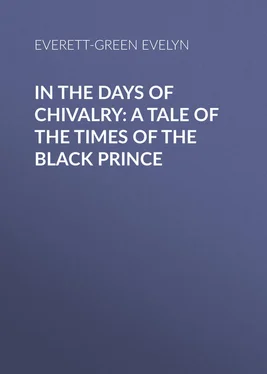Evelyn Everett-Green - In the Days of Chivalry - A Tale of the Times of the Black Prince
Здесь есть возможность читать онлайн «Evelyn Everett-Green - In the Days of Chivalry - A Tale of the Times of the Black Prince» — ознакомительный отрывок электронной книги совершенно бесплатно, а после прочтения отрывка купить полную версию. В некоторых случаях можно слушать аудио, скачать через торрент в формате fb2 и присутствует краткое содержание. Жанр: foreign_antique, foreign_prose, на английском языке. Описание произведения, (предисловие) а так же отзывы посетителей доступны на портале библиотеки ЛибКат.
- Название:In the Days of Chivalry: A Tale of the Times of the Black Prince
- Автор:
- Жанр:
- Год:неизвестен
- ISBN:нет данных
- Рейтинг книги:3 / 5. Голосов: 1
-
Избранное:Добавить в избранное
- Отзывы:
-
Ваша оценка:
- 60
- 1
- 2
- 3
- 4
- 5
In the Days of Chivalry: A Tale of the Times of the Black Prince: краткое содержание, описание и аннотация
Предлагаем к чтению аннотацию, описание, краткое содержание или предисловие (зависит от того, что написал сам автор книги «In the Days of Chivalry: A Tale of the Times of the Black Prince»). Если вы не нашли необходимую информацию о книге — напишите в комментариях, мы постараемся отыскать её.
In the Days of Chivalry: A Tale of the Times of the Black Prince — читать онлайн ознакомительный отрывок
Ниже представлен текст книги, разбитый по страницам. Система сохранения места последней прочитанной страницы, позволяет с удобством читать онлайн бесплатно книгу «In the Days of Chivalry: A Tale of the Times of the Black Prince», без необходимости каждый раз заново искать на чём Вы остановились. Поставьте закладку, и сможете в любой момент перейти на страницу, на которой закончили чтение.
Интервал:
Закладка:
How their young hearts swelled with delighted expectation at the thought of leaving behind the narrow life of the mill, and going forth into the wide world to seek fame and fortune there! And England was no such foreign land to them, albeit they had never been above ten leagues from the mill where they had been born and brought up. Was not their mother an Englishwoman? Had she not taught them the language of her country, and begged them never to forget it? And could they not speak it now as well as they spoke the language of Gascony – better than they spoke the French of the great realm to which Gascony in a fashion belonged?
The thought of travel always brings with it a certain exhilaration, especially to the young and ardent, and thoughts of such a journey on such a quest could not but be tinged with all the rainbow hues of hope.
"We will go; we will go right soon!" cried Gaston. "Would that we could go tomorrow! Why have we lingered here so long, when we might have been up and doing years ago?"
"Nay, Brother, we were but children years ago. We are not yet sixteen. Yet methinks our manhood comes the faster to us for that noble blood runs in our veins. But we will speak to Father Anselm. He has always been our kindest friend. He will best counsel us whether to go forth, or whether to tarry yet longer at home – "
"I will tarry no longer; I pant to burst my bonds," cried the impetuous Gaston; and Raymond was in no whit less eager, albeit he had something more of his mother's prudence and self-restraint.
"Methinks the holy Father will bid us go forth," he said thoughtfully. "He has oft spoken to us of England and the Roy Outremer, and has ever bidden us speak our mother's tongue, and not forget it here in these parts where no man else speaks it. I trow he has foreseen the day when we should go thither to claim our birthright. Our mother told him many things that we were too young to hear. Perchance he could tell us more of Basildene than she ever did, if we go to him and question him thereupon."
Gaston nodded his head several times.
"Thou speakest sooth, Brother," said he. "We will go to him forthwith. We will take counsel with him, albeit – "
Gaston did not finish his sentence, for two reasons. One was that his brother knew so well what words were on his lips that speech was well-nigh needless; the other, that he was at that moment rudely interrupted. And although the brothers had no such thought at the time, it is probable that this interruption and its consequences had a very distinct bearing upon their after lives, and certainly it produced a marked effect upon the counsel they subsequently received from their spiritual father, who, but for that episode, might strongly have dissuaded the youths from going forth so young into the world.
The interruption came in the form of an angry hail from a loud and gruff voice, full of impatience and resentment.
"Out of my path, ye base-born peasants!" shouted a horseman who had just rounded the sharp angle taken by the narrow bridle path, and was brought almost to a standstill by the tall figures of the two stalwart youths, which took up the whole of the open way between the trees and their thick undergrowth. "Stand aside, ye idle loons! Know ye not how to make way for your betters? Then, in sooth, I will teach you a lesson;" and a thick hide lash came whirling through the air and almost lighted upon the shoulders of Gaston, who chanced to be the nearer.
But such an insult as that was not to be borne. Even a Gascon peasant might well have sprung upon a solitary adversary of noble blood had he ventured to assault him thus, without support from his train of followers. As for Gaston, he hesitated not an instant, but with flashing eyes he sprang at the right arm of his powerful adversary, and had wrested the whip from him and tossed it far away before the words were well out of the angry lord's mouth.
With a great oath the man drew his sword; but the youth laughed him to scorn as he stepped back out of reach of the formidable weapon. He well knew his advantage. Light of foot, though all unarmed, he could defy any horseman in this wooded spot. No horse could penetrate to the right or left of the narrow track. Even if the knight dismounted, the twin brothers, who knew every turn and winding of these dim forest paths, could lead him a fine dance, and then break away and let him find his way out as best he could. Fearless and impetuous as Gaston ever was, at this moment his fierce spirit was stirred more deeply within him than it had ever been before, for in this powerful warrior who had dared to insult both him and his brother, ay, and their mother's fair fame too – he recognized the lineaments of the hated Sieur de Navailles.
The more cautious Raymond had done the same, and now he spoke in low though urgent accents.
"Have a care, Brother! Knowest thou who it be?"
"Know? ay, that I do. It is he who now holds by force and tyranny those fair lands which should be ours – lands which our forefathers held from generation to generation, which should be theirs now, were right and justice to be had, as one day it may be, when the Roy Outremer comes in person, as men say he will one day come, and all men may have access to his royal presence. And he, the tyrant, the usurper, dares to call us base born, to call us peasants, we who own a nobler name than he!
"The day will come, proud man, when thou shalt rue the hour when thou spakest thus to me – to me who am thy equal, ay, and more than thy equal, in birth, and who will some day come and prove it to thee at the sword's point!"
Many expressions had flitted over the rider's face as these bold words had been spoken – anger, astonishment, then an unspeakable fury, which made Gaston look well to the hand which held the shining sword; last of all an immense astonishment of a new kind, a perplexity not unmixed with dismay, and tinged with a lively curiosity. As the youth ceased speaking the knight sheathed his sword, and when he replied his voice was pitched in a very different key.
"I pray you pardon, young sirs," he said, glancing quickly from one handsome noble face to the other. "I knew not that I spoke to those of gentle birth. The dress deceived me. Tell me now, good youths, who and whence are ye? You have spoken in parables so far; tell me more plainly, what is your name and kindred?"
Raymond, who had heard somewhat of the enmity of the Sieur de Navailles, and knew that their identity as sons of the house of De Brocas had always been kept from his knowledge, here pressed his brother's arm as though to suggest the necessity for caution; but Gaston's hot blood was up. The talk they had been holding together had strung his nerves to the utmost pitch of tension. He was weary of obscurity, weary of the peasant life. He cared not how soon he threw off the mask. Asked a downright question, even by a foe, it was natural to him to make a straightforward answer, and he spoke without fear and without hesitation.
"We are the sons of Arnald de Brocas. De Brocas is our name; we can prove it whenever such proof becomes needful. Our fathers held these fair lands long ere you or yours did. The day may come when a De Brocas may reign here once more, and the cursed brood of Navailles be rooted out for ever."
And without waiting to see the effect produced by such words upon the haughty horseman, the two brothers dashed off into the wood, and were speedily lost to sight.
CHAPTER II. FATHER ANSELM
The mill of Sainte-Foi, which was the home of the twin brothers of the De Brocas line, was situated upon a tributary stream of the river Adour, and was but a couple of leagues distant from the town of Sauveterre – one of those numerous "bastides" or "villes Anglaises" built by the great King Edward the First of England during his long regency of the province of Gascony in the lifetime of his father. It was one of those so-called "Filleules de Bordeaux" which, bound by strong ties to the royal city, the queen of the Garonne, stood by her and played so large a part in the great drama of the Hundred Years' War. Those cities had been built by a great king and statesman to do a great work, and to them were granted charters of liberties such as to attract into their walls large numbers of persons who helped originally in the construction of the new townships, and then resided there, and their children after them, proud of the rights and immunities they claimed, and loyally true to the cause of the English Kings, which made them what they were.
Читать дальшеИнтервал:
Закладка:
Похожие книги на «In the Days of Chivalry: A Tale of the Times of the Black Prince»
Представляем Вашему вниманию похожие книги на «In the Days of Chivalry: A Tale of the Times of the Black Prince» списком для выбора. Мы отобрали схожую по названию и смыслу литературу в надежде предоставить читателям больше вариантов отыскать новые, интересные, ещё непрочитанные произведения.
Обсуждение, отзывы о книге «In the Days of Chivalry: A Tale of the Times of the Black Prince» и просто собственные мнения читателей. Оставьте ваши комментарии, напишите, что Вы думаете о произведении, его смысле или главных героях. Укажите что конкретно понравилось, а что нет, и почему Вы так считаете.












